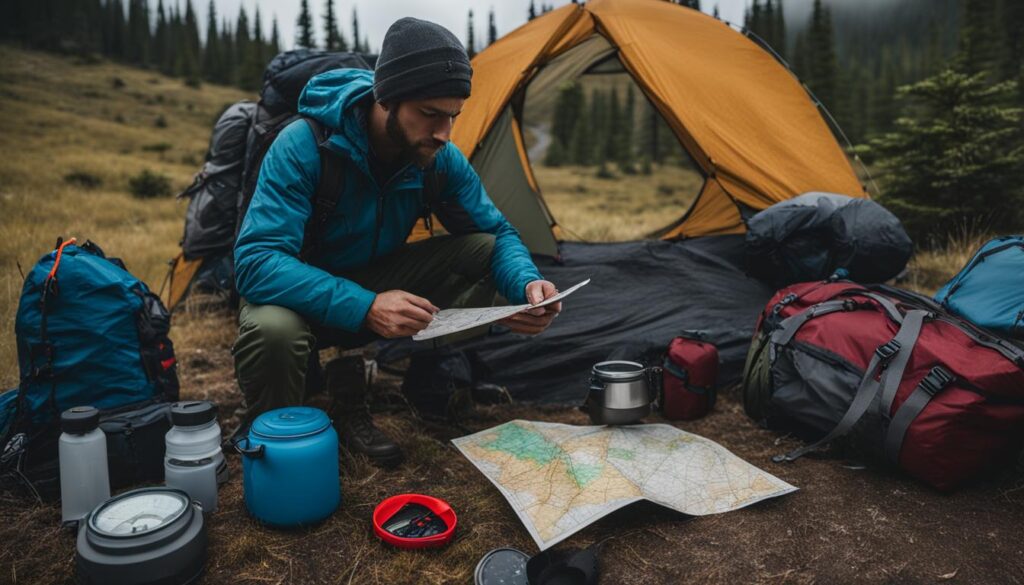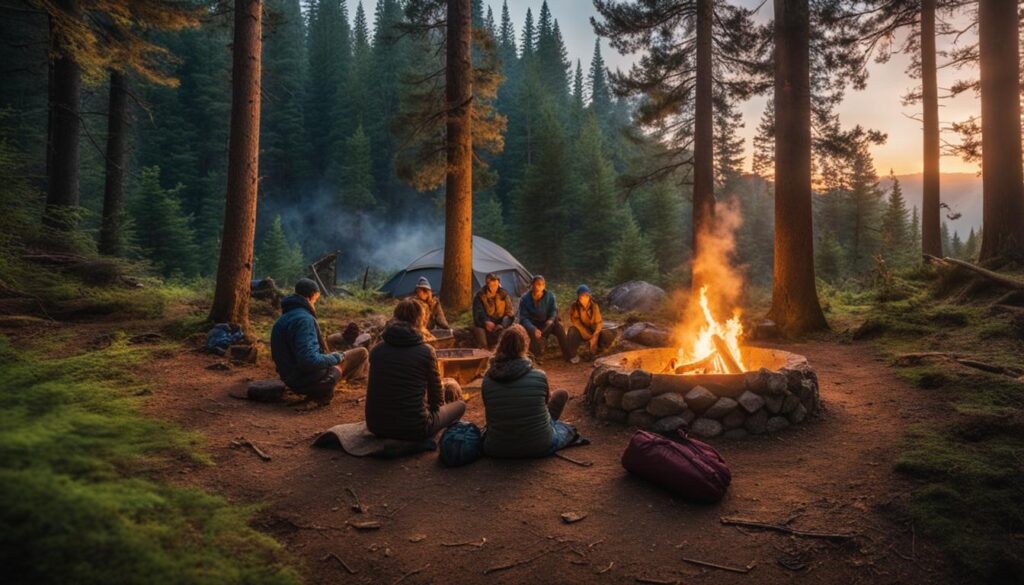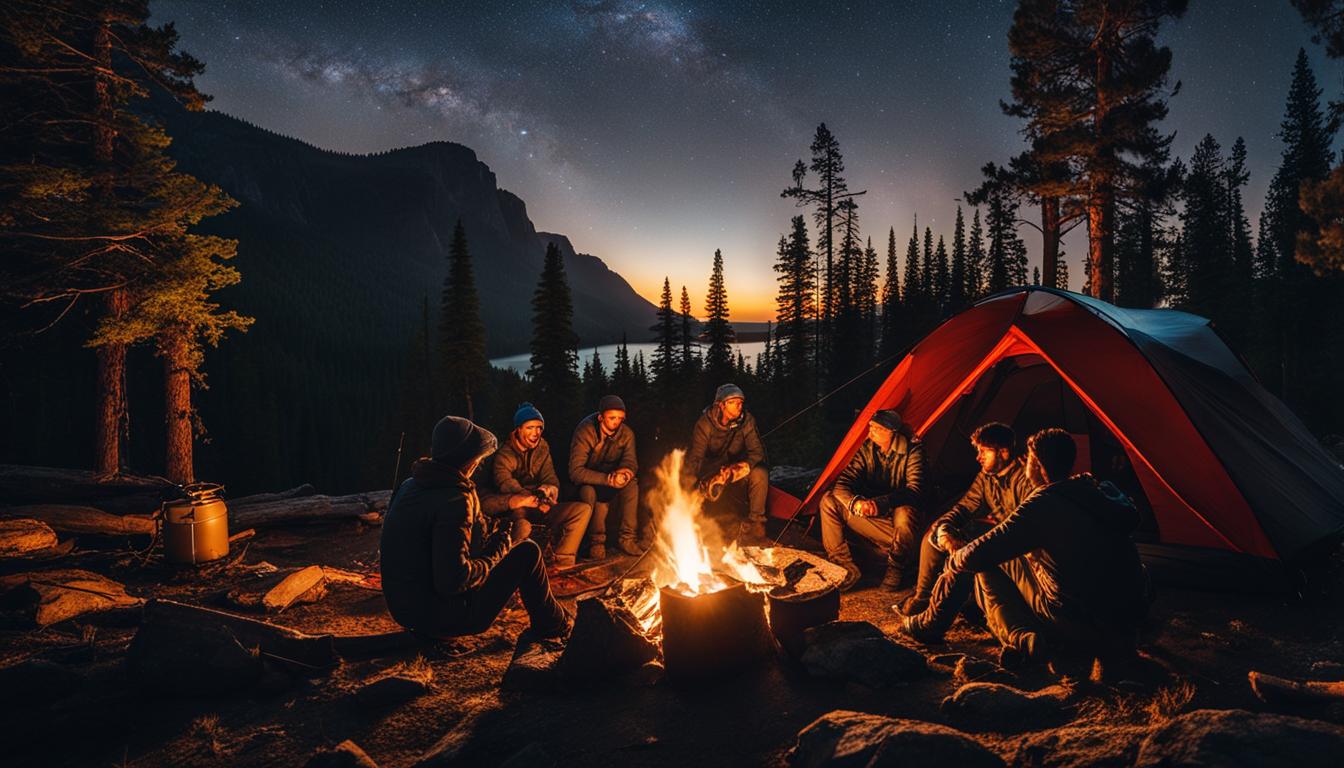The Leave No Trace Center for Outdoor Ethics has established the Seven Principles of Leave No Trace, which serve as guidelines for minimizing environmental impact while enjoying the great outdoors. These principles apply to backpackers and anyone visiting natural spaces. The principles are constantly updated based on research from experts in outdoor education and land management.
The seven principles cover topics such as planning ahead and preparing, traveling and camping on durable surfaces, disposing of waste properly, leaving what you find, minimizing campfire impacts, respecting wildlife, and being considerate of other visitors. By following these principles, backpackers can practice responsible hiking and sustainable camping, ensuring the preservation of nature for future generations.
Key Takeaways:
- The Seven Principles of Leave No Trace are guidelines for minimizing environmental impact.
- Backpackers should plan ahead and prepare for their trips, considering regulations and potential hazards.
- Minimizing campfire impacts and respecting wildlife are crucial for responsible backpacking.
- By following these principles, backpackers can enjoy nature while leaving it untouched for future generations.
The Importance of Planning Ahead and Prepare

When embarking on a backpacking trip, environmental stewardship and responsible hiking should be top priorities. One of the fundamental principles of Leave No Trace is planning ahead and preparing for your adventure. By taking the time to research and understand the area you will be visiting, you can ensure that you are well-equipped and knowledgeable about any regulations or special concerns.
Being aware of potential hazards and extreme weather conditions is crucial for both your safety and the preservation of the environment. By scheduling your trip to avoid times of high use and visiting in small groups, you can minimize your impact on the fragile ecosystems you will encounter. Repackaging food to minimize waste is another essential step in responsible hiking. Not only does this reduce the amount of trash you generate, but it also makes it easier to pack and carry your supplies, making your backpacking experience more enjoyable.
Table: Essential Preparations for Backpacking
| Preparation | Description |
|---|---|
| Research the Area | Familiarize yourself with the terrain, regulations, and any special concerns of the area you will be backpacking in. |
| Check Weather Conditions | Be aware of potential hazards and extreme weather conditions that may affect your trip. Pack appropriate clothing and gear. |
| Schedule Wisely | Avoid times of high use to minimize impact. Consider visiting in smaller groups to reduce the overall footprint. |
| Repackage Food | Transfer food to reusable, lightweight containers to minimize waste and make packing easier. |
| Leave an Itinerary | Inform someone of your plans, including your intended route and estimated return time. |
Using a map and compass or GPS instead of marking paint or rock cairns helps preserve the natural landscape and ensures that future backpackers can experience the wilderness as intended. By following these guidelines and taking the time to plan ahead and prepare, you can embark on a sustainable hiking adventure that leaves minimal impact on the environment. Remember, responsible hiking starts with thoughtful preparation.
Minimizing Campfire Impacts and Respecting Wildlife

Two important principles of Leave No Trace for backpackers are minimizing campfire impacts and respecting wildlife. Campfires have long been a part of camping culture, but they can have lasting negative effects on the environment. To minimize campfire impacts, it is crucial to consider alternative methods of cooking and lighting. Using a lightweight stove for cooking and a candle lantern for light are sustainable options that reduce the need for campfires.
If campfires are permitted in the area, it is essential to follow guidelines to minimize their impact. Using established fire rings or pans helps contain the fire and prevent damage to the surrounding vegetation. Keeping fires small and burning all wood and coals to ash before scattering the cool ashes further reduces the risk of wildfires and protects the landscape. By being mindful of these practices, backpackers can enjoy the cozy ambiance of a campfire while ensuring minimal environmental harm.
Respecting wildlife is another crucial aspect of Leave No Trace principles. It is important to observe wildlife from a distance and avoid disturbing their natural behavior. Feeding wildlife can lead to dependency and disrupt their natural foraging patterns, so it is vital to refrain from offering them food. Additionally, securely storing food and trash helps prevent wildlife from being attracted to campsites, reducing the risk of human-wildlife conflicts and safeguarding both backpackers and animals.
Additional Tips for Minimizing Campfire Impacts and Respecting Wildlife:
- Before building a campfire, check local regulations and restrictions to ensure fires are allowed in the area.
- If fires are permitted, use existing fire rings or pans whenever possible to minimize the impact on the ground.
- Only use dead and downed wood for campfires and avoid cutting live trees or breaking branches.
- Never leave a campfire unattended and ensure it is fully extinguished before leaving the campsite.
- When encountering wildlife, maintain a safe distance and observe without approaching or trying to interact with them.
- Dispose of waste properly by using designated trash receptacles or packing out all garbage.
By following these practices and being considerate of the natural environment and its inhabitants, backpackers can contribute to the preservation of ecosystems and the enjoyment of outdoor spaces for generations to come.
Conclusion
The Seven Principles of Leave No Trace are an essential framework for responsible hiking and sustainable camping. By following these principles, I can engage in minimal impact camping, ensuring the preservation of our natural environment for future generations.
Leave No Trace embodies the values of environmental stewardship and encourages backpackers like myself to plan ahead and prepare, travel and camp on durable surfaces, dispose of waste properly, leave what we find, minimize campfire impacts, respect wildlife, and be considerate of other visitors. By incorporating these principles into our outdoor adventures, we can minimize our impact and contribute to the longevity of our natural spaces.
These principles are continuously updated based on scientific research and are widely recognized and used by outdoor enthusiasts and organizations. By embracing the ethos of Leave No Trace, I take responsibility for my actions in the backcountry and strive to leave nature untouched.

